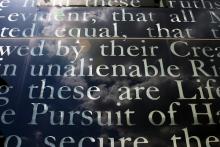dehumanization

I KNOW YOU. I met you in the dense canopies in the war in El Salvador. It was there that I first heard the single, high-pitched crack of the sniper bullet. Distinct. Ominous. A sound that spreads terror. I saw you at work in Basra in Iraq and of course Gaza, where on a fall afternoon at the Netzarim Junction, you shot dead a young man a few feet away from me. We carried his limp body up the road. I lived with you in Sarajevo during the war. You were only a few hundred yards away, perched in high rises that looked down on the city. I witnessed your daily carnage.
You targeted me, too. You struck down colleagues and friends. I was in your sights traveling from northern Albania into Kosovo. Three shots. That crisp crack, too familiar.
I know how you talk. The black humor. “Pint-sized terrorists” you say of the children you kill. You are proud of your skills. It gives you cachet. You cradle your weapon as if it is an extension of your body. You admire its despicable beauty. This is who you are. A killer.

"We hold these truths to be self-evident, that all men are created equal, that they are endowed by their Creator with certain unalienable Rights, that among these are Life, Liberty, and the pursuit of Happiness (The Declaration of Independence, 1776)."
These words are some of the most familiar and beloved in the English language, as they offer a moral vision for humanity, and a standard to which the United States of America should strive.
While such expressions of freedom should indeed be cherished, we often forget the harsh reality that many contributors of the Declaration of Independence were also active participants in the brutal act of slavery. As the English abolitionist Thomas Day wrote in 1776: “If there be an object truly ridiculous in nature, it is an American patriot, signing resolutions of independency with the one hand, and with the other brandishing a whip over his affrighted slaves.”
In addition to racial inequality, while Abigail Adams reminded her husband John to “remember the ladies” during the Constitutional Convention of 1787, her warnings were mostly disregarded, and as a result, women were also marginalized, and they were relegated as dependents of men, without the power to own property, make contracts, or vote. In other words, John Adams’ reply to Abigail’s challenge was far from considerate: “As to your extraordinary code of laws, I cannot but laugh …”
Recently, Wikileaks, an online whistleblower site, released a video which was dubbed "Collateral Murder." I write as a former member of the Infantry c